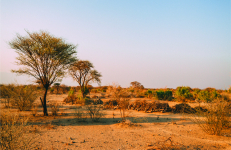NEPAD deliberate Financing Climate Change in Africa

Paris – The 21st session of the Conference of the Parties (UNFCCC COP 21) popularly known as the "Climate Change Meeting" commenced today at Le Bougert, Paris. The conference is attended by at least 147 Heads of States and world leaders who will express their views on climate change. NEPAD was amongst the first of the four partners of the Africa Pavilion to host a side event on "Financing Climate Change Adaptation in Africa". The 90 minutes event was graced by former president of Ghana, President John Kufour who is also UN Secretary General's Special Envoy on Climate Change.
The NEPAD PICD Director, Estherine Fotabong made a presentation on the NEPAD Climate Change Fund which offers support to AU member states Regional Economic Communities & CSOs in targeted areas of support. She stated that the fund targets projects in areas of; adaptation of agriculture to climate change, biodiversity Management, access and benefit sharing, development and implementation support to National Adaptation Plans (NAPs) to mention but a few. She also stated that the fund has an extended focus to support lower capacity and climate vulnerable communities in Africa to benefit from climate finance by providing a tailored funding windows for public, civil society and private sectors, the fund would also seek to access international climate finance such as The Green Climate Fund and World Bank CIFs.
The UN Secretary General's Special Envoy on Climate Change, President John Kufour said that African institutions such as NEPAD have a critical role to play in supporting member states to benefit from climate financing and providing technical assistance in building capacity at national and local level. The former president commended the NEPAD Agency on establishment of the NEPAD Climate Change Fund and requested NEPAD to continue exploring various avenues of increasing the size of the fund.
About the COP
The United Nation’s Framework Convention on Climate Change (UNFCCC) is the supreme decision-making body of the Convention. All States that are Parties to the Convention are represented at the COP, at which they review the implementation of the Convention and any other legal instruments that the COP adopts and take decisions necessary to promote the effective implementation of the Convention, including institutional and administrative arrangements. A key task for the COP is to review the national communications and emission inventories submitted by Parties. Based on this information, the COP assesses the effects of the measures taken by Parties and the progress made in achieving the ultimate objective of the Convention. The COP meets every year, unless the Parties decide otherwise. The COP meets in Bonn, the seat of the secretariat, unless a Party offers to host the session. Just as the COP Presidency rotates among the five recognised UN regions – that is, Africa, Asia, Latin America and the Caribbean, Central and Eastern Europe and Western Europe and others.



